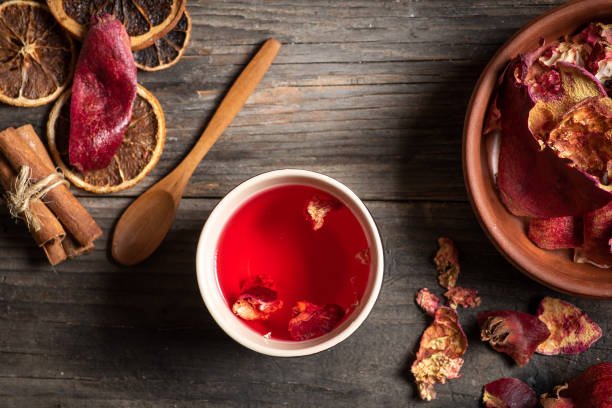Pomegranate (Shi Liu) is a fruit that has been consumed for centuries due to its delicious taste and potential health benefits. While the arils (seeds) and juice of pomegranate have been extensively studied, the rind of the fruit has gained attention in recent years for its rich content of bioactive compounds. Pomegranate rind, which is often discarded as waste, has shown promising potential in various areas of health and medicine. This article aims to provide an overview of the studies conducted on pomegranate rind and its potential health benefits.
Chemical Composition: Pomegranate rind is rich in various bioactive compounds, including phenolic compounds, flavonoids, tannins, anthocyanins, and ellagitannins. These compounds contribute to the antioxidant, anti-inflammatory, antimicrobial, and anticancer properties of pomegranate rind.
Health Benefits:
-
Antioxidant Activity: Pomegranate rind extracts have shown strong antioxidant activity, which helps in neutralizing harmful free radicals and reducing oxidative stress in the body. This property may contribute to the prevention of chronic diseases such as cardiovascular diseases, diabetes, and cancer.
-
Anti-inflammatory Effects: Studies have demonstrated that pomegranate rind extracts possess anti-inflammatory properties. These extracts can inhibit the production of pro-inflammatory molecules and reduce inflammation in various tissues and organs. This anti-inflammatory effect may be beneficial in managing inflammatory conditions such as arthritis and inflammatory bowel disease.
-
Antimicrobial Activity: Pomegranate rind extracts have exhibited antimicrobial activity against various bacteria, fungi, and viruses. These extracts can inhibit the growth and replication of pathogens, making them potentially useful in the treatment of infections.
-
Anticancer Potential: Several studies have reported the potential anticancer effects of pomegranate rind extracts. These extracts have shown the ability to inhibit the growth and proliferation of cancer cells, induce apoptosis (programmed cell death), and inhibit angiogenesis (formation of new blood vessels that supply tumors). However, further research is needed to fully understand the mechanisms and potential applications of pomegranate rind in cancer treatment.
Conclusion: Pomegranate rind, often considered as waste, is a rich source of bioactive compounds with potential health benefits. Its antioxidant, anti-inflammatory, antimicrobial, and anticancer properties make it a promising candidate for further research and development. Incorporating pomegranate rind extracts into functional foods, dietary supplements, or pharmaceutical formulations may provide a natural and effective approach to promote health and prevent diseases. However, more studies are needed to determine the optimal extraction methods, dosage, and potential side effects of pomegranate rind extracts.
Pomegranate rind has been used in traditional Chinese medicine (TCM) for centuries due to its potential health benefits. In TCM, pomegranate rind is believed to have cooling and astringent properties, making it useful for treating various conditions. Here are some traditional uses of pomegranate rind in TCM:
- 1. Diarrhea and Dysentery: Pomegranate rind is commonly used to treat diarrhea and dysentery in TCM. Its astringent properties help to reduce bowel movements and relieve symptoms.
- 2. Intestinal Parasites: Pomegranate rind is believed to have anthelmintic properties, meaning it can help eliminate intestinal parasites. It is often used in combination with other herbs to treat parasitic infections.
- 3. Digestive Disorders: Pomegranate rind is used to improve digestion and relieve symptoms of indigestion, bloating, and abdominal pain in TCM.
- 4. Skin Conditions: Pomegranate rind is sometimes used topically in TCM to treat skin conditions such as acne, eczema, and rashes. Its astringent and anti-inflammatory properties may help reduce inflammation and promote healing.
It’s important to note that while pomegranate rind has a long history of use in TCM, scientific research on its efficacy and safety is limited. Further studies are needed to validate these traditional uses and determine the optimal dosage and potential side effects of pomegranate rind in TCM applications. It is always recommended to consult with a qualified TCM practitioner or healthcare professional before using any herbal remedies.

